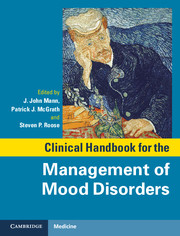Book contents
- Clinical Handbook for the Management of Mood Disorders
- Clinical Handbook for the Management of Mood Disorders
- Copyright page
- Contents
- List of contributors
- Section 1 Introduction
- Section 2 Medical management
- Section 3 Psychotherapies for mood disorders
- Section 4 Specific modalities of treatment
- Section 5 The promise of biomarkers and response prediction
- Section 6 Future directions
- Index
Section 1 - Introduction
Published online by Cambridge University Press: 05 May 2013
- Clinical Handbook for the Management of Mood Disorders
- Clinical Handbook for the Management of Mood Disorders
- Copyright page
- Contents
- List of contributors
- Section 1 Introduction
- Section 2 Medical management
- Section 3 Psychotherapies for mood disorders
- Section 4 Specific modalities of treatment
- Section 5 The promise of biomarkers and response prediction
- Section 6 Future directions
- Index
Summary
- Type
- Chapter
- Information
- Publisher: Cambridge University PressPrint publication year: 2013



